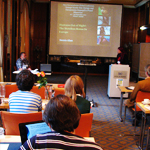Humans Out Of Sight: Stateless Roma In The European Union: 1990-2010
-
-

-
Presentation speakers
- Nermin Allam, University of Alberta
- Download presentation
Abstract:
Rather than the conceptually illusive foreigner, across time and space, Romani people were seen to embody what is alien and different. On their sudden arrival in the 14th and 15th centuries, the Roma were perceived by Europe, that was only just beginning to come under state organization and control, as alarming intruders, nomads without hearth or territory, and soon encountered distrust and rejection. Rejection was accompanied by consistently hostile attitudes and policies that cemented the Roma’s de facto and de jure statelessness. In today’s Europe Roma finds themselves at the heart of a Europe characterized by increasing transnationalism and mobility, yet the negative attitude against Roma’s transnationality is still salient. In other words, although their presence as a transnational community present everywhere yet have no country of reference or origin make them pioneers of European transnationalism yet it is the ultimate paradox that Roma are prosecuted and rejected for living by this transnational values.(Liegeois 283)While the European Union(EU) has always been sensitive to this difficult situation of the Roma and has an ongoing concern to improve it, in many cases there is a glaring contradiction between expressions at the EU level and the European states level. With this in mind, the paper examines the extent to which Roma statelessness is a state-determined status. Contrary to the mainstream understanding of statelessness as a legal limbo, the central premise of this research is that elements of state discrimination are common to all forms of Roma statelessness. Statelessness makes them rightless in the face of state discrimination and sightless from international protection. In testing this hypothesis, the research will analyse the tensions between Roma and the EU member states despite improvements in the EU stateless protection regime between 1990 and 2010. -
Related Presentations

Sceptical Images Of The European Union. Euroscepticism Of Turkish University Students
- Zeliha Nilüfer Nahya

A European Affair: The Role Played By The EC In The Spanish Transition To Democracy
- Alan David Granadino Gonzalez

Development Of Environmental Infrastructure In The EU: Possibilities For Evaluation
- Jurijs Spiridonovs



















